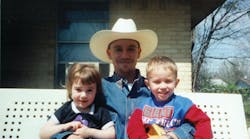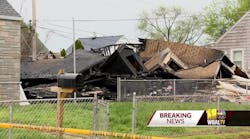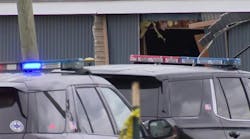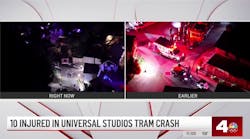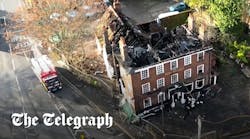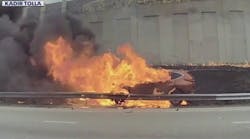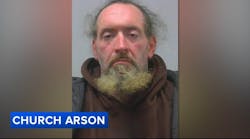April 11--WEST -- Stand at the corner of Oak and Main streets in downtown West, and you can hardly tell one-third of the town was ripped apart a year ago.
Townsfolk walk up and down Oak, in and out of restaurants and drugstores. Locals chat about high school baseball and a planned business trip to Temple.
To see what's changed -- change that's a source of pride for some and of anxiety for others -- you have to travel a few blocks north, where new homes with stone facades are replacing the low brick ones built in the '50s and '60s. These are the houses close to what's left of the West Fertilizer Plant.
As the anniversary of the April 17 fertilizer plant explosion approaches, people in West are coming to terms with the fact that their rebuilt town will be different -- better, in some respects -- than the old one they loved so much. The idea of benefiting from the greatest tragedy in West's history makes some of them uneasy.
People are confronting a lot of decisions they never expected, such as whether this rural enclave needs a fertilizer plant nearby to serve surrounding farms, and how they should feel about so much investment coming from so much death and destruction.
"There is no way of measuring the people that died, and saying we are benefitting from the loss," Mayor Tommy Muska said. "I don't ever think you can say you are benefitting from it, but we're rebuilding. We're going to build it back, and it might end up being better the way we build it."
A lot of people liked it the way it was before.
Until April 17, 2013, West was known as a quiet town north of Waco with really good kolaches and a nice Czech festival. West and its 2,600 inhabitants were thrust into the national spotlight when 15 people died, nearly 200 were injured and more than 175 homes and businesses were damaged in the fertilizer plant explosion on the north side.
A fire in the plant began around 7:30 p.m. The volunteer fire department responded and almost immediately called for assistance, and students in a nearby emergency medical technician class rushed over. A building used for storage and offices was engulfed in flames; eventually its roof collapsed. The state fire marshal's office later determined that the fire started in this building.
At 7:50 p.m., as emergency officials retreated and started ushering people out of the area, the plant exploded with a force witnesses compared to military-style bombs. The blast killed a dozen responders at the scene and two nearby residents, injured dozens and ripped homes apart. A third resident died a few days later, as officials were starting to investigate how the ammonium nitrate exploded with the force of up to 10 tons of TNT.
A lengthy investigation could not determine a cause, though it ruled out some possibilities such as hazardous chemicals inside the building igniting the fire.
God-awful Noise
Bill Killough, 78, said he was sitting in his recliner drinking a beer when the house around him scattered and fell, as if someone had shaken a snow globe.
"It was the most God-awful noise you ever heard of in your life," Killough recalled. "I don't know what a small atomic bomb sounds like, but I think that's close."
A neighbor dug Killough and his wife, Polly, out of the rubble, and they hightailed it to the Czech Inn, the only hotel in West.
"I knew it'd fill up before too long," Killough said last month, saying he wanted to claim a room on the first floor.
A former contractor who had rebuilt part of his house a year before the blast, Killough was one of the first into the hotel and one of the first out, he said. He made the garage of his home livable and eight weeks later moved back in. Killough spent four months sorting out the insurance and coordinating a crew to rebuild his house.
Now Polly's garden is coming back strong and her 2012 Mustang has a new roof. The blast rippled the metal.
Across the street, empty lots await new homes. In every direction, something is being rebuilt from the ground up.
The city is on a construction tear as well. After some fits and starts and the arm-twisting of state officials, West received a federal disaster declaration.
"The system does work," Muska said. "You have to be patient, maybe when you don't want to be patient because you're in the middle of all this."
Almost anytime the sun is up, you can hear a hammer, somewhere, pounding away.
It isn't the constant construction that frays some nerves, however. It's little things that send people's thoughts back to the blast. Families struggle to decide whether to light fireworks on July 4. Someone watering a lawn winces at the crack of a bat from ball fields a block away.
The total disaster aid available to West, from state and federal sources, is $20 million. Of that, $9 million is small business loans. Muska said he plans to spend $3 million on street, water and sewer improvements in the most affected area alone. That's about half the city's public assistance.
School district officials have their own long list of projects. The explosion destroyed the middle and high schools in West. Both are being replaced on a single campus, set to open in 2016. Until then, classes are scattered in a temporary school, made of metal buildings wedged alongside the middle school football stadium.
Planning Ahead
Volunteers and staff handling donation and recovery efforts are still plodding through the work.
"The goal as of May 3 is not to have a warehouse anymore," said Suzanne Hack, director of West Long Term Recovery.
Now crammed into a former funeral home, the agency set up after the blast to handle relief efforts is still letting folks pick through the remaining stock. Where toiletries and urgently needed items took precedence during the chaotic days after the explosion, people relocating to homes and apartments might now be looking for dishes and lamps.
By the end of March, the group had disbursed $1.6 million of the $3.6 million donated to help West residents. The money is spent in many ways, from demolishing a condemned home to replacing landscaping when insurance wasn't enough.
Even places in the community untouched by the blast, at least physically, will benefit from the investment in West by some charities. The Society of St. Vincent de Paul donated $62,000 so West could hire a planning firm to develop a master plan for the city. Before the blast, the city would have been stretched to afford a master plan.
Now the city is talking about luring small manufacturers, warehouses and even some tourist dollars.
Its greatest advantage is its proximity to Interstate 35, where the Czech Stop gas station and bakery almost acts as a welcome center for northbound travelers and kolache-seekers. A new store, Slovacek's, a transplant from Snook, now greets those headed south with its own gas pumps and Czech pastries.
That same quick freeway access makes West attractive for small manufacturers or transportation companies, said Charles Whatley, a consultant with KAI, the company leading the master plan process.
Just as West's residents champion its small-town feel, its economic prospects are more attuned to local companies. The city could chase one very large employer to create jobs and invest, Whatley said, but having many smaller opportunities might be a better fit.
"Frankly, those 20 business owners, particularly if five or 10 live in West, are going to be more inclined to support what is going on in West than one owner who isn't here," Whatley said.Tough Decisions
West Fertilizer Co. was one of those businesses. Its owner, Donald Adair, was known in the community, and locals ran it. All that's left of the plant is a handful of red storage trailers, a couple of small carts for moving fertilizer and deep scars in the earth. A fence surrounds the site.
"When everything is done, the lawsuits, the Adairs are not going to own it anymore," Muska predicted. "If the city could get its hands on it I think it could be an industrial park."
The tougher task might be balancing the sensitivity to the explosion with the needs of local farmers. Without the West plant, they must go to Hillsboro and Leon -- each 20 or 30 miles from the farms -- to get fertilizer.
"I think down the road, we need a fertilizer plant somewhere," Muska said. "Right now, it might be a hard sell for people here."
'Love Wins'
Whatever happens to the site or wherever local farmers have to go to get fertilizer, it's all but certain that West will do its mourning and memorializing on the other side of the railroad tracks from the blast site.
"This is our 9/11, so speak," Muska said, standing in the street across from the plant next to a little park where neighborhood children used to swing and slide.
It's here the city will build its memorial, Muska said. Despite back surgeries and rebuilding his own heavily damaged home, Muska has been both insurance agent and city official.
"I am going to sit down once there is a grieving place," he said. "I just haven't had a chance to do that."
In the meantime, residents make do with smaller symbols of what happened. Stars painted with words like "hope" and "stay strong" are staked in front of homes. A "hope tree" adorned with laminated stars bears inspirational messages. A tattered American flag flies at half-staff near the community's emergency medical headquarters.
"The flags have stayed there ever since," Muska said. "When they have the ceremony or open house to open the new EMS building, they are going to take them down."
Each milestone, however important, is hard to identify as the one that shows the town considers itself rebuilt. There have been little signs, like new homes and the return of school children when the temporary school was built.
Muska also pointed to small social cues. People south of town, largely unaffected by the blast, started to wonder if having children's birthday parties was appropriate.
"I think some people thought, 'Is it OK for me to have fun?' " Muska said. "Is it all right to drink a beer and laugh? I think it took people a while to adjust, but people are smiling more."
At some point, residents said, resilience took hold and hasn't let go.
"People are ready," Hack said of the changes coming to West with new homes and schools and memorials.
"I definitely think there is a change in the community in the last few months. I think they bought into the fact they want the city to be there for their grandchildren."
At a recent economic development meeting, that focus on the future was clear. To the adults around the table, the big map of the tiny town of West was a tool to plan reconstruction following a horrific fertilizer plant explosion.
Alison Gardner, 6, was more interested in the white space on the paper map. She quietly composed a drawing while the grown-ups talked about the community's rural and farming heritage, its Czech roots and its increasing diversity.
"This is love and the earth," Alison said after the meeting was over, pointing proudly at the heart she had drawn with sharp red marks. "This is the explosion and this is the earth turning the explosion back to love because love wins. I wrote 'I love West' because love wins."
Copyright 2014 - Houston Chronicle
